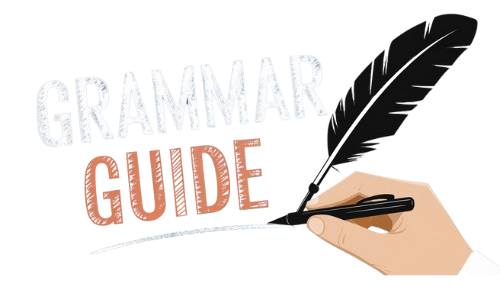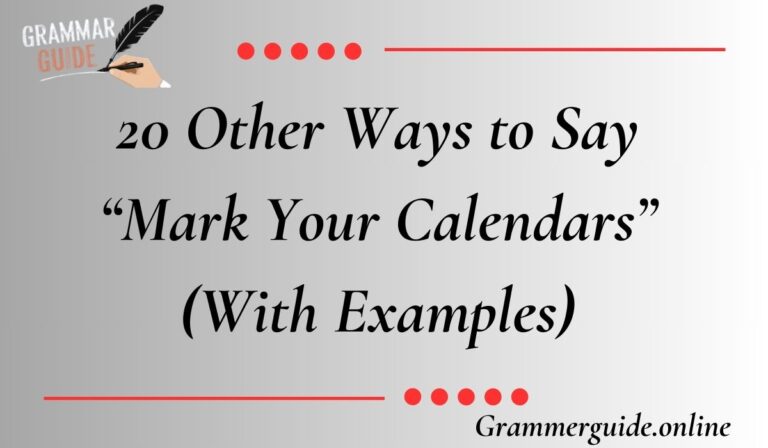Sometimes, we need to remind people about important dates, but saying “Mark Your Calendars” all the time can get repetitive.
There are many other ways to say it, depending on the situation. For formal events, you can use “Save the date” or “Reserve this date.”
Casual gatherings might call for “Pencil this in” or “Circle the date.” If you need urgency, phrases like “Don’t miss this date” or “Block off this day” work well. Using different expressions keeps communication fresh and engaging.
Why You Need Synonyms for “Mark Your Calendars” in Both Written and Oral Communication
Using different ways to say “mark your calendars” helps keep your communication fresh and engaging. Repeating the same phrase can feel monotonous, especially in professional or social settings.
By varying your wording, you can match the tone of your message, whether it’s formal, friendly, or urgent. Additionally, different expressions may resonate better with specific audiences, ensuring your message is clear and compelling.
What To Say Instead of “Mark Your Calendars”
There are plenty of alternatives depending on the context. For a professional setting, you might say, “Please save the date” or “Kindly note this event.” In a more casual situation, phrases like “Don’t forget!” or “Make sure to jot this down” work well.
If urgency is needed, “Set a reminder” or “Be sure to remember” can be effective. Choosing the right phrase makes your communication more engaging and suitable for your audience.
Mark Your Calendars: 20 Ways to Remember Important Dates
1. Save the Date (Formal)
This phrase is commonly used for formal events such as weddings, corporate gatherings, and official meetings. It informs recipients about an upcoming event and implies that further details will follow.
Example: “Please save the date for our annual conference on September 15th. More details to come!”
Short Letter:
Dear Team,
Please save the date for our annual company retreat on October 10th. A formal invitation with details will be sent soon.
Best regards,
[Your Name]
2. Circle the Date (Casual)
This phrase is more informal and friendly, often used in casual invitations. It suggests an important date that shouldn’t be forgotten.
Example: “Hey everyone, circle the date—July 20th! It’s going to be an amazing summer BBQ.”
Short Letter:
Hey Friends,
Circle the date—June 5th! We’re planning a beach day, and we don’t want you to miss out. See you there!
Cheers,
[Your Name]
3. Note the Date (Neutral)
A straightforward and neutral way to inform someone of an important date. Works well in both casual and professional settings.
Example: “Please note the date of our upcoming strategy meeting: March 3rd.”
Short Letter:
Dear Colleagues,
Please note the date of our Q2 review meeting on April 15th. Your presence is highly valued.
Best,
[Your Name]
4. Block Off This Day (Directive)
A more commanding phrase that urges the recipient to reserve the day without making other plans.
Example: “Block off this day—October 12th. It’s our big product launch!”
Short Letter:
Dear Team,
Please block off this day—November 20th—for our all-hands meeting. Attendance is mandatory.
Best,
[Your Name]
5. Keep the Day Open (Suggestive)
This phrase politely suggests reserving a day without making it sound like a strict requirement.
Example: “Keep the day open on September 5th. We might have a fun surprise planned!”
Short Letter:
Dear Friends,
Keep the day open on December 10th—we have something exciting planned! Details soon.
Best,
[Your Name]
6. Highlight This Date (Emphatic)
This phrase emphasizes the importance of the date and suggests marking it prominently.
Example: “Highlight this date—May 14th. It’s our biggest sale of the year!”
Short Letter:
Dear Customers,
Highlight this date—March 1st! Our grand opening sale is happening, and you won’t want to miss it.
Best,
[Your Business]
7. Put This on Your Agenda (Professional)
Used in business settings to ensure an event is included in someone’s schedule.
Example: “Put this on your agenda: The annual board meeting on July 10th.”
Short Letter:
Dear Team,
Please put this on your agenda—the quarterly financial review on August 22nd.
Best regards,
[Your Name]
8. Reserve This Date (Formal)
A professional and polite way to request someone to hold a date for an event.
Example: “Please reserve this date—November 5th—for our charity gala.”
Short Letter:
Dear Guests,
Please reserve this date—September 30th—for our annual fundraising event.
Sincerely,
[Your Name]
9. Pencil This In (Informal)
A flexible way to suggest holding a date, implying it might change.
Example: “Pencil this in—May 10th. We’re planning a casual meet-up!”
Short Letter:
Hey Friends,
Pencil this in—June 15th! We’re thinking of a fun day trip. More details soon.
Cheers,
[Your Name]
10. Don’t Forget This Date (Reminder)
A simple reminder to ensure the date isn’t overlooked.
Example: “Don’t forget this date—October 1st. It’s our anniversary celebration!”
Short Letter:
Dear Customers,
Don’t forget this date—July 4th! We’re hosting a special holiday event just for you.
Best,
[Your Business]
11. Mark This Date (Direct)
A straightforward way to tell someone to remember a date.
Example: “Mark this date—December 24th! We’re throwing a holiday party.”
Short Letter:
Dear Friends,
Mark this date—November 25th—for our Thanksgiving gathering. Hope to see you!
Best,
[Your Name]
12. Set a Reminder for This Date (Practical)
Encourages using a digital or physical reminder for the date.
Example: “Set a reminder for this date—June 30th—for the project deadline.”
Short Letter:
Dear Team,
Please set a reminder for this date—April 20th—for the final project submission.
Best,
[Your Name]
13. Save the Day (Optimistic)
A cheerful way to ask someone to keep a date free.
Example: “Save the day—August 14th! It’s our company picnic.”
Short Letter:
Dear Team,
Save the day—July 10th! We’re celebrating our company’s anniversary together.
Best,
[Your Name]
14. Don’t Miss Out on This Date (Encouraging)
Creates excitement and a sense of urgency.
Example: “Don’t miss out on this date—October 31st! Our Halloween bash is happening.”
Short Letter:
Dear Guests,
Don’t miss out on this date—December 31st! Join us for an unforgettable New Year’s Eve party.
Best,
[Your Name]
15. Make a Note of This Date (Informative)
A clear and direct way to inform someone of an important date.
Example: “Make a note of this date—June 25th. It’s our annual summit.”
Short Letter:
Dear Attendees,
Make a note of this date—September 15th—for our leadership seminar. Looking forward to seeing you!
Best,
[Your Name]
16. Put It on Your To-Do List
Encourages adding an event or task to a checklist for better organization.
Example: “Put it on your to-do list—April 15th! Tax deadline is approaching.”
Short Letter:
Dear Team,
Put this on your to-do list—March 30th is the deadline for project submissions.
Best,
[Your Name]
17. Write It Down
A simple and direct reminder to record an important date.
Example: “Write it down—September 3rd. First day of school!”
Short Letter:
Dear Students,
Write it down—April 10th is our final exam. Be prepared!
Best,
[Your Teacher]
18. Take Note of This Date
A more formal reminder to remember an important day.
Example: “Take note of this date—March 12th. Big announcement coming!”
Short Letter:
Dear Staff,
Take note of this date—June 1st. It marks the beginning of our new project cycle.
Best,
[Your Name]
19. Block Your Calendar
A strong suggestion to keep the date free.
Example: “Block your calendar—May 5th—for our important workshop.”
Short Letter:
Dear Team,
Block your calendar—October 20th! We have an all-day training session.
Best,
[Your Name]
20. Reserve the Date
“Reserve the Date” is a formal and polite way to ask someone to keep a specific day open for an event.
Example:
“Please reserve the date—October 10th—for our annual charity gala. A formal invitation will follow.”
Frequently Asked Questions
What does “Mark Your Calendars” mean?
It is a phrase used to remind people to save a date for an important event.
When should I use “Mark Your Calendars”?
Use it when announcing upcoming events, meetings, or special occasions that require attendance.
Can I use synonyms for “Mark Your Calendars”?
Yes! There are many alternatives like “Save the Date,” “Take Note of This Date,” and “Block Your Calendar.”
Is “Mark Your Calendars” used in formal settings?
Yes, but it is more commonly used in informal and semi-formal contexts. For formal settings, “Save the Date” or “Reserve the Date” is preferred.
How can I encourage others to “Mark Your Calendars”?
Use engaging language, emphasize the importance of the event, and send timely reminders.
Conclusion
Using different ways to say “Mark Your Calendars” can make your communication more engaging and suitable for different settings.
Whether you choose a formal, casual, or directive approach, the key is to ensure your audience remembers the date. Keep your messages clear and compelling to ensure participation!

Robert is a talented content writer and digital marketer with expertise in SEO, social media management, and online marketing.







